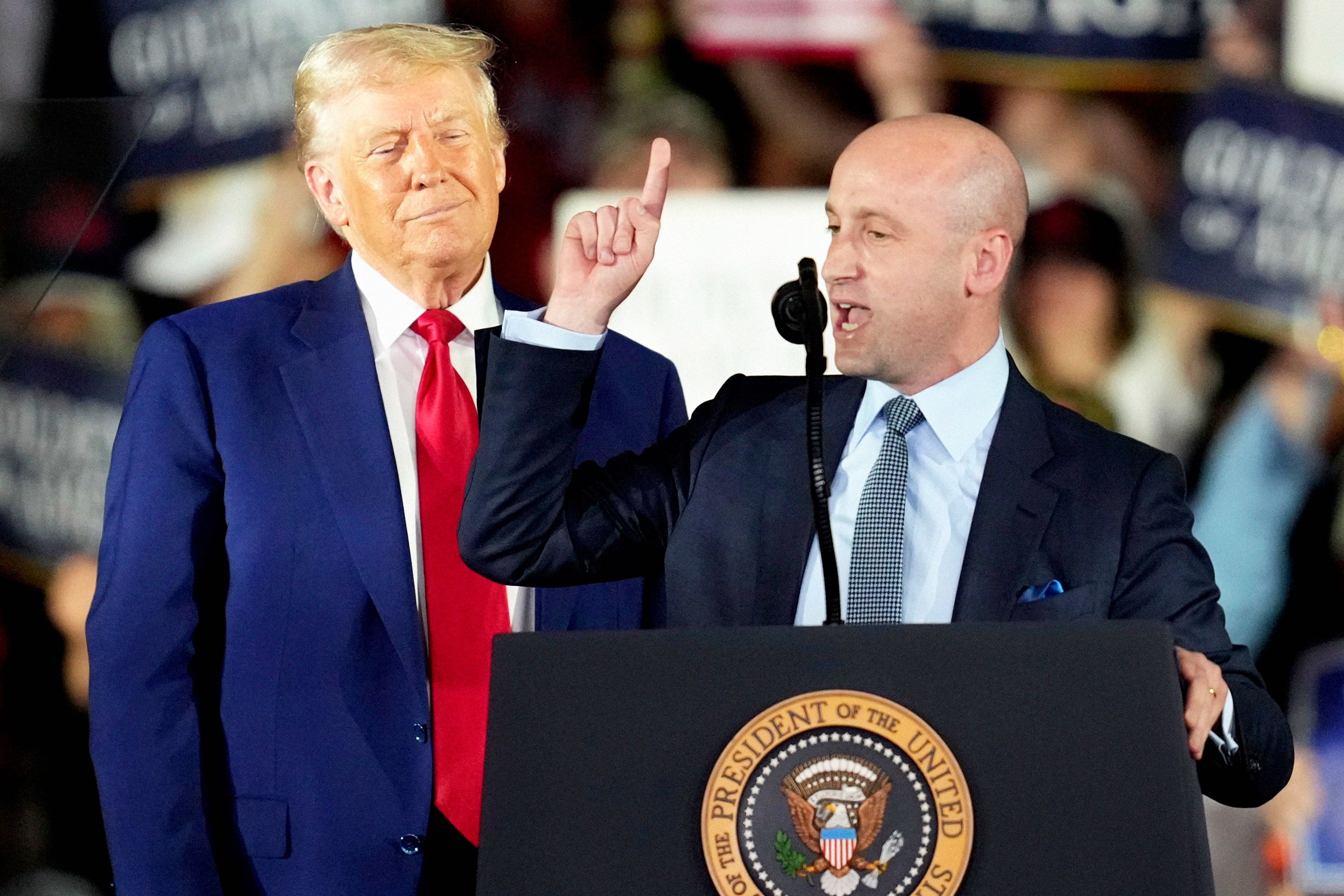Within hours of the murder of conservative podcaster and activist Charlie Kirk—and in the absence of a suspect—high-profile figures on the right, from vice president JD Vance to deputy White House chief of staff for policy Stephen Miller, already had a different culprit in mind: nonprofit organizations.
On September 11, a day after Kirk’s murder, US representative Chip Roy, a Republican of Texas, sent a letter to request the formation of a select committee on “the money, influence, and power behind the radical left’s assault on America and the rule of law.” On September 17, in a post on Truth Social, President Trump announced that he was designating “antifa”—a term generally used for antifascist activism but not the name of a specific group—a “major terrorist organization.” “I will also be strongly recommending that those funding ANTIFA be thoroughly investigated in accordance with the highest legal standards and practices,” he wrote.
According to reporting from The New York Times, members of the Justice Department are drafting plans for a potential investigation of Open Society Foundations, a global grant network founded by billionaire George Soros. Soros has long been the center of antisemitic and right-wing conspiracy theories. The organization, which funds civil society and democracy-promoting initiatives around the world, gives grants to thousands of organizations and individuals, including the American Civil Liberties Union, Amnesty International, and several universities.
In response, OSF released a statement saying that the accusations were “politically motivated” and that the organization’s work is dedicated to “strengthening democracy and upholding constitutional freedoms.” But for many in the nonprofit space, it’s the realization of a threat that has hung over the industry for months.
“Funders have done the most thinking about this—some have been meeting quietly for months,” says Brian Reich, a strategist whose company, Little M Media, works with nonprofit organizations. Options on the table, according to sources who spoke to WIRED, have included figuring out how to set up emergency funds, merging organizations together if one or more get shuttered, gearing up for potential legal battles, relocating out of the US, and letting go of 501(c)(3) tax status in favor of reregistering as a business.
“We are going,” says Reich, “to have to think radically differently.”
In the US, nonprofits enjoy a special status as 501(c)(3) organizations—a reference to the section of the tax code governing them. Any donations they receive are tax deductible for donors. While they may work on causes favored by one political party or another—say, climate change or abortion access—they are “prohibited from directly or indirectly participating in, or intervening in, any political campaign on behalf of (or in opposition to) any candidate for elective public office,” according to the Internal Revenue Service.
But in the wake of the Kirk shooting, Reich says, “the White House cares more about winning the public opinion fight and will make all these nonprofits look like left-wing, super-liberal monsters.”
At Kirk’s memorial service, Miller railed against “enemies,” saying, “We will prevail over the forces of wickedness and evil … And to those trying to incite violence against us, those trying to foment hatred against us, what do you have? You have nothing. You are nothing.”
“It is possible, but wrong, to see a kind of defense of civil society as a partisan instrument,” says Benjamin Soskis, a scholar of philanthropy and civic life. “It’s just a function of history that when arguments about the importance of challenging government arise, they’re almost always done in the face of some kind of strong central state. And they tend to absorb the opposite partisan valence from whatever they’re pushing back against.” In other words, a conservative government breeds a civil society that might prioritize more liberal issues, and vice versa. Miller, for example, founded a nonprofit organization, America First Legal, during the Democratic presidency of Joe Biden; Kirk’s Turning Point USA was founded during the Obama administration, in 2012, and has raked in hundreds of millions of dollars as a registered 501(c)(3) nonprofit.
“Civic life is one that transcends partisan lines and that if it’s available now for people on the left it will be available for people on the right in the future,” says Soskis.
But a few weeks ago, Vance joined a chorus of people in and around the Trump administration who vowed to “go after the NGO network that foments, facilitates, and engages in violence.” It’s unclear exactly what Vance and other members of the administration mean by this—the nonprofit world is large and includes foundations and funders that give out grants, as well as organizations, both in the US and abroad, that actually run initiatives on the ground.
In a post on X, Andy Ngo, an influential right-wing writer, wrote, “People are mistaken to think that Soros ‘pays’ Antifa rioters. Rather, huge sums of money from his philanthropy arm goes through several layers before reaching far-left radical nonprofits, groups and projects on the ground that are part of the Antifa network. Democrats at the county and state level also provide funding to Antifa-allied groups.” The post quotes Fox Business anchor Elizabeth MacDonald, alleging that a “massive nonprofit network” worked to support initiatives like bail reform facilitated the property destruction that accompanied the 2020 racial justice protests (they were largely peaceful). “Antifa activists were suspected to play a part in the overall 2020 rioting, but there has not been enough investigation to determine their role,” wrote MacDonald. Elon Musk shared the post over the weekend.
In a statement, the OSF wrote, “The Open Society Foundations have unequivocally condemned the horrific murder of Charlie Kirk. Our thoughts are with his family and all who are mourning his loss. A free and open society depends on people being able to express their views without fear of violence. We are dedicated to upholding the fundamental freedoms guaranteed by the U.S. Constitution and strengthening democracy. We oppose all forms of violence and condemn the outrageous accusations to the contrary. Our work is entirely peaceful and lawful. It is disgraceful to use this tragedy for political ends to dangerously divide Americans and attack the First Amendment.”
For many in the nonprofit sector, though, this is just the culmination of a monthslong, if not yearslong, campaign to blame these organizations for creating, funding, or supporting groups that the administration and its allies consider “the radical left.” This includes groups working on topics like racial and climate justice as well as reproductive rights and voting rights. Foundations and funders in particular have been leading the charge to strategize about how to help the sector push back. Earlier this year, philanthropic organizations came together in a campaign called Unite in Advance, seeing the signs that the sector was likely to become the focus of attacks from the Trump administration. In May, Republican legislators attempted to add language to the “one big beautiful bill” that would allow “terrorist supporting” organizations to be stripped of their nonprofit status. In July, Senator Ted Cruz of Texas introduced the Stop Financial Underwriting of Nefarious Demonstrations and Extremist Riots (Stop FUNDERs) Act.
“Every American has the right to freedom of speech and peaceful protest but not to commit violence. Domestic NGOs and foreign adversaries fund and use riots in the United States to undermine the security and prosperity of Americans,” Cruz said in a statement at the time.
Rusty Stahl, founder and president of Fund the People, which works with nonprofits and funders, says, “Some folks have really tried to prepare for attacks on individual organizations by reviewing their finances, making sure they’re compliant with accounting standards and audits and the tax laws around the government nonprofits.
“Unlike these big companies that are giving $16 million to the Trump administration in order to get these mergers through,” he says, nonprofits don’t have the kind of assets to launch legal challenges or make the kinds of payments that can get them out of harm’s way. This means that they have to consider other options.
Some organizations, says Stahl, are considering what it would mean to dissolve themselves and start up again as a limited liability company. In some ways, this would make moving money easier, especially for organizations that do international work. But it would also significantly reduce transparency around donations and how money is being spent. Moving an organization’s headquarters—and its bank accounts—to another country could theoretically protect its finances, but there’s no guarantee that it would be able to get money back into the US to continue work on the ground there. (Shortly before Trump’s inauguration, a Canadian law firm hosted a webinar for nonprofits considering relocating their headquarters to the country.)
Reich says that several organizations are already talking about what ways an attack by the administration could be challenged legally. “Nonprofits will probably win in court and that will be in a year or two,” he says. But by that point the administration will have had ample time to spread narratives like the one shared by Ngo—as well as, perhaps, to tie up their resources in defending themselves in court. “The point is destroying [nonprofits’] reputations,” says Reich, “and having the power to dictate how and where money gets spent.”
In the meantime, the uncertainty in the field means that foundations and funders are now looking to move money out more quickly—both to support organizations that may be feeling the pain of other donors pulling back and to ensure that the sector is ready for a more difficult operating environment than ever.
“We’re moving money to meet grantee needs and needs in communities,” says John Palfrey, president of the John D. and Catherine T. MacArthur Foundation, which is a member of Unite in Advance. Palfrey noted other government funding cuts, including to the US Agency for International Development and other federal grants, have meant that organizations like the MacArthur Foundation are already racing to disburse money to their grantees to help plug the gaps.
“We are telling the organizations we work with to be adamant with founders, that if they don’t fund us now there may not be a sector left,” says Ashleigh Subramanian-Montgomery, acting director of the Charity and Security Network, which works with nonprofits that operate in challenging conditions.
Subramanian-Montgomery says her organization has advised the nonprofits it works with that they shouldn’t comply in advance, but that some organizations are already “removing stuff from their website that could make them at higher risk.” She says she’s worried, however, that even the threats of defunding could cause people to “really start self-censoring, then changing programming completely,” she says. “Then there wouldn’t even be a civil society to push back on government policy.”
But what that civil society could look like is up in the air. “The Trump administration is going to set the sector on fire,” says Reich. “It’s going to need to be rebuilt.”




